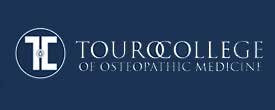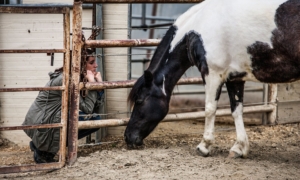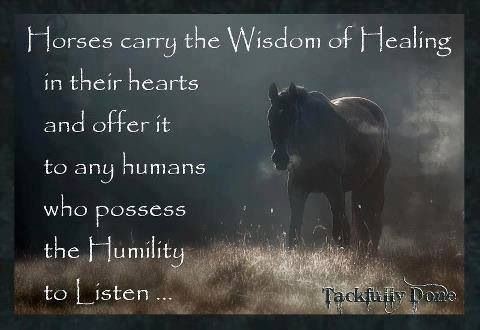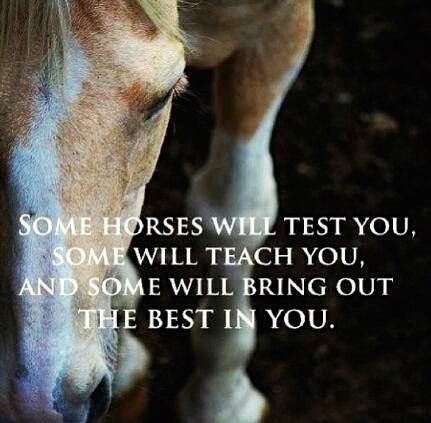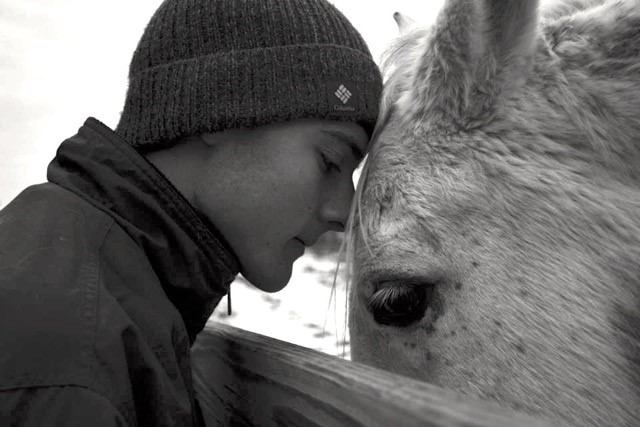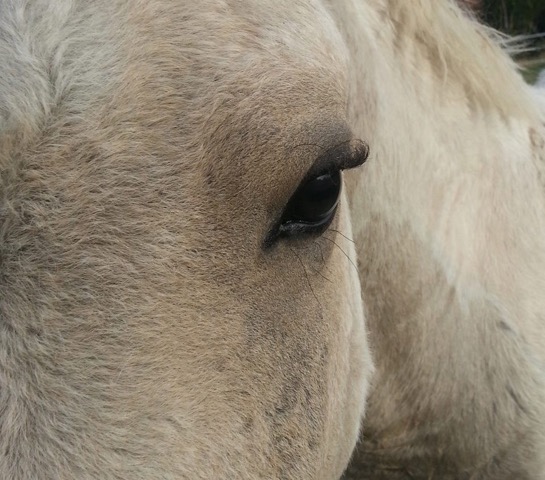Medicine and Horsemanship
Horses teach students the value of non-verbal communication and beside manners
August 25, 2017: News12
Students at one medical college in Orange County are getting hands-on experience in a very unique way. Students at Touro Medical College in Middletown are using horses instead of people as part of their training. The course is offered at Raven Hill Farms in Florida and offers an introduction to medicine.
Program coordinators say the course helps students learn how to interact with new patients. The students focus on body language and cues from the horses just like they would if they were treating real patients. Touro is one of a handful of medical schools nationwide offering the Medicine and Horsemanship program.
Participant Comments:
That was a unique experience. Thank you for the opportunity! And a credit to the “stable” faculty who helped them get the “mane” points…
I think a lot of what went on was really reflective of ourselves and things we need to do to further develop ourselves before we are able to help our patients.”
“I loved being able to work with the horses. It is also so much fun to be able to work among my fellow classmates in such a unique environment.”
“This was wonderful! It was so nice to be in a new environment and help our careers.”
” Awareness is not just about self, learn to ask for help and to give and take.”
“Non-verbal communication with a horse is similar to non-verbal communication with a human. Did not expect that.”
“Great experience! Helped me understand the significance of body language and how important it is to make the patient comfortable and at ease.”
“This was a great group size and experience. I learned so much about myself and working with others.”
“Understanding what I bring to a group dynamic, what my own agenda is. The importance of recognizing where you are personally, and the importance of recognizing how and what other people around you are experiencing.”
“This program is an amazing addition to our school!”
“It was interactive with clear goals and tasks. Very organized and really got something out of it. I loved the observation afterward, and introspection. I loved the program!”
“Enjoyed the correlations between our interactions between the horses an our lives. Enriched my relationship with my first year peers.”
“Learned you have to believe in yourself for the horses to believe in you. Principles are the same when it comes to patients; can’t believe how it relayed so much toithe world of medicine.”
“This program definitely helped me see how I can influence a patient as well as learn better group dynamics.”
“I became much more aware of how the patient reacts to my presence/confidence.”
“Learned to perfect my non-verbal communication skills and think from a different perspective.”
“I was made more aware of how my actions and demeanor reflected in the patient.”
“Learned to approach patients in unique and effective ways.”
“I can’t stress how eye-opening this program was. I learned what it really means to connect. I also learned to think in a more fluid manner.”
“I learned how important intention is when interacting with your patients.”
“This program really emphasized the importance of connecting with your patient, clearly communicating, and maintaining your energy.”
“I loved the feedback received by the instructors, they were very kind, comforting, and wise.”
“I learned to be more patient and how even subtle, non-verbal cues are important.”
“Patients require patience and empathy. We should always keep this in mind as future doctors.”
“The horses could pick up on feelings, so you need to leave you insecurities, etc. at the door.”
“I learned you need to approach patients with confidence in order to gain their trust.”
“Very supportive staff, open and welcoming, and very enthusiastic.”
NOTE: Based upon the success of this program, Touro College has written Horsemanship and Medicine into their curriculum as a mandatory course for all first year medical students.
Medical students enhance patient skills by interacting with horses
The exercise at Raven Hill Farms in Warwick is to understand the value of non-verbal communications
WARWICK — Eighteen first-and second-year medical students from Touro College of Osteopathic Medicine in Middletown, along with their professor and staff, recently spent an unusual afternoon at Raven Hill Farms, a local horse farm in the Town of Warwick. The students participated in an innovative training program designed to transform the doctor-patient relationship.
Raven Hill Farms, situated on 36 acres, is home to Equi-Power Solutions, an equine experiential learning program for personal and professional development. On Friday, March 11, 2016, the students took part in the Medicine and Horsemanship program, created to enhance the health care professional’s awareness of non-verbal communication skills to more effectively connect with patients.
Program originates at Stanford
The program was originally developed by Dr. Beverly Kane, MD and Dr. Allan Hamilton and initiated at Stanford University in 2005. The program has expanded around the globe and is incorporated into the curriculum at Mass General University, UCSF, and University of Arizona to name just a few.
The session at Raven Hill Farms began in a newly constructed conference room with an overview of the program, a review of horse dynamics and an emphasis on learning in a non-judgmental, open-ended manner. Facilitators included Director of Development Deirdre Hamling, owner and operator of Raven Hill Farms, equine specialist Susan Stegmeyer and licensed clinical social worker Bonnie Malajian.
Five horses, all different
Following the introduction, the group moved to the large indoor arena where five horses of different shapes, sizes and temperaments were the focus of the students to use their observation skills to interpret the horse’s behavior. Breaking into smaller groups the students chose the horse they preferred to work with. As they groomed the horses they became aware of how their approaches needed to differ from horse to horse and were surprised by how much their intention effected the reactions of the horses.
In the second exercise, the group was asked to construct a pathway out of various poles, rubber cones and assorted balls that would represent their journey through medical school. And his or her task was to get each horse to travel the pathway without the help of any halter or lead ropes.
Each and every moment was filled with learning opportunities that were later discussed when the students returned to the conference room, where there were numerous comparisons of how the horses behaviors mirrored the intention of the students, often in remarkable ways.
These moments were designed to enable the students to discover how their actions, whether conscious or unconscious, played a pivotal role in their relationships with their patients as well as with the other students.
“As prey animals,” said Hamling, “horses are sensitive to everything they see, hear and feel which can be interpreted by understanding their body language. We might even refer to them as living, breathing biofeedback machines.”
The skills learned working with horses, she explained, help participants build confidence, mindfulness and emotional intelligence.
“Interacting with horses,” said Hamling, “enables us to learn clear and effective ways to build trust and gain respect. Their cooperation with the students was based on a number of factors, such as rapport, trust, clear communication, patience, tone, body position, eye contact, respect of boundaries and how, if and when to touch. It is clear that these are the very same factors that enable patient compliance, cooperation and improved outcome.”
‘Holistic philosophy’
The entire program was embraced by all the students.
“This was an exciting, interesting and unique educational opportunity for the medical students from Touro College of Osteopathic Medicine,” said Dr. Alex Joanow, a founding partner of Horizon Family Medical Group and adjunct clinical assistant professor at Touro College. “It provided an experience to develop communicative skills that hopefully, the students will use throughout their careers. It certainly melds with the holistic philosophy that is the foundation of osteopathic medicine.”
In addition to this program, Equi-Power Solutions offers corporate development, team building and leadership workshops as well as personal development sessions for individuals, couples, families and groups. All sessions are unmounted, interactive, solution-based with no previous horse experience necessary.
Raven Hill Farms is a private riding club and home to Jockey Hollow Pony Club as well as a full service equine boarding and training facility.
For additional information contact Hamling at 845-987-6965.
Horses make great companions for psychotherapy because they can mirror and respond to human behavior. And crucially, ‘there’s no judgment with a horse’
It’s Saturday night in downtown Long Beach, California, and laughter can be heard from the streets below. Sarah Smith is sprawled on her bed, diligently peeling through sociology notes, preparing for her impending exams. An acoustic guitar rests against her bed, and a colorful gay-pride flag is pinned next to her bookshelf.
At first glance, Sarah comes across as a typical college student – but her serious blue eyes sometimes betray a history of violence, abandonment and emotional trauma. Read More from The Guardian
‘Barnyard’ Teaches Doctors Bedside Skills
Horses help medical students learn how to better care for patients
(VIDEO: AZPM)
Life as a medical student isn’t just about learning anatomy or practicing how to do a physical. At the University of Arizona College of Medicine, it can also include a little horsing around.
Students in Allan Hamilton’s From Barnyard to Bedside class are learning to be better doctors—from horses.
“You know, when you have a thousand-pound patient, you really respect him,” says Hamilton, a UA professor of neurosurgery who is also a horse whisperer. On his 17-acre ranch, Rancho Bosque, Hamilton works with horses to teach medical students the awareness and nonverbal communication skills they’ll need to really connect with their patients.
“There’s a big difference between being a doctor and a healer,” he says. “The doctor is just giving you information and is a spectator, and the healer says ‘we’re in this together.’”
Hamilton was a horse lover long before he was a healer. Although he grew up in New York City, he learned about horses and country living during visits to his grandfather.
The need to have horses in his life was what drew Hamilton to Tucson, and ultimately to Rancho Bosque.
“We actually moved out here because they had a great cancer center here, and I’m involved in surgery on brain tumors and that kind of thing, [and] we really wanted a place to raise horses,” he says. “Those were the two requirements: You had to have a lot of brain tumors, and you had to have a place to keep horses.”
But Hamilton kept his medical world and his horse world separate—until he noticed that he acted like a different person in each of his two worlds.
“I began to notice all this crazy stuff I was doing, like putting up x-rays and talking to the x-rays and not to the patient,” he says. “I’d have the patient behind me, which is ridiculous. And I started to think, man, I would never use that kind of body language training horses.”
Hamilton began to wonder if spending time with horses would help his colleagues and students work more effectively with their patients.
“Since it all originated with horses, I thought, well, it’s a crazy idea but let’s try it,” he recalls. “And it worked.”
Hamilton has now been teaching his From Barnyard to Bedside class for 12 years and has shared his curriculum with a number of other medical schools.
The course has been both popular and successful, according to Hamilton, because it forces students to tune in to their emotions and body language.
Because horses are so sensitive to nonverbal cues, students have to learn to quiet themselves and stay in the moment, Hamilton says, and that enables them to finally listen to their patients.
“You gradually discover that it isn’t about the horses. You think you’re working on the horses, but you end up working on yourself,” he says. “And so what happens with these students is they come back four years later and say, ‘This was the most important class I had in medical school, because it really taught me about myself.’”
Second-year medical student Engel Ottman found her first time at Rancho Bosque so transformative that she’s come back to do it again.
“As doctors, we’re very verbal people and we’re used to using our brains and our words to solve problems,” Ottman says. “And what I like about this is we have to calm down and connect with our energy and our bodies. And since in medicine we’re interacting with the patient’s body and energy and emotions, I think that’s why this is particularly valuable.”
For Hamilton, every trip out to his pastures is a valuable opportunity to learn.
“I once said to somebody, if you look at a herd of horses, just imagine a crowd of Tibetan monks coming toward you. They’re like sensei,” he says. “So I learn every single day, I can honestly say that.”
Arizona Public Media broadcast stations are licensed to the Arizona Board of Regents. Arizona Public Media and AZPM are registered trademarks of the Arizona Board of Regents.
Life as a medical student isn’t just about learning anatomy or practicing how to do a physical. At the University of Arizona College of Medicine, it can also include a little horsing around.
Students in Allan Hamilton’s From Barnyard to Bedside class are learning to be better doctors—from horses.
“You know, when you have a thousand-pound patient, you really respect him,” says Hamilton, a UA professor of neurosurgery who is also a horse whisperer. On his 17-acre ranch, Rancho Bosque, Hamilton works with horses to teach medical students the awareness and nonverbal communication skills they’ll need to really connect with their patients.
“There’s a big difference between being a doctor and a healer,” he says. “The doctor is just giving you information and is a spectator, and the healer says ‘we’re in this together.’”
Hamilton was a horse lover long before he was a healer. Although he grew up in New York City, he learned about horses and country living during visits to his grandfather.
The need to have horses in his life was what drew Hamilton to Tucson, and ultimately to Rancho Bosque.
“We actually moved out here because they had a great cancer center here, and I’m involved in surgery on brain tumors and that kind of thing, [and] we really wanted a place to raise horses,” he says. “Those were the two requirements: You had to have a lot of brain tumors, and you had to have a place to keep horses.”
But Hamilton kept his medical world and his horse world separate—until he noticed that he acted like a different person in each of his two worlds.
“I began to notice all this crazy stuff I was doing, like putting up x-rays and talking to the x-rays and not to the patient,” he says. “I’d have the patient behind me, which is ridiculous. And I started to think, man, I would never use that kind of body language training horses.”
Hamilton began to wonder if spending time with horses would help his colleagues and students work more effectively with their patients.
“Since it all originated with horses, I thought, well, it’s a crazy idea but let’s try it,” he recalls. “And it worked.”
Hamilton has now been teaching his From Barnyard to Bedside class for 12 years and has shared his curriculum with a number of other medical schools.
The course has been both popular and successful, according to Hamilton, because it forces students to tune in to their emotions and body language.
Because horses are so sensitive to nonverbal cues, students have to learn to quiet themselves and stay in the moment, Hamilton says, and that enables them to finally listen to their patients.
“You gradually discover that it isn’t about the horses. You think you’re working on the horses, but you end up working on yourself,” he says. “And so what happens with these students is they come back four years later and say, ‘This was the most important class I had in medical school, because it really taught me about myself.’”
Second-year medical student Engel Ottman found her first time at Rancho Bosque so transformative that she’s come back to do it again.
“As doctors, we’re very verbal people and we’re used to using our brains and our words to solve problems,” Ottman says. “And what I like about this is we have to calm down and connect with our energy and our bodies. And since in medicine we’re interacting with the patient’s body and energy and emotions, I think that’s why this is particularly valuable.”
For Hamilton, every trip out to his pastures is a valuable opportunity to learn.
“I once said to somebody, if you look at a herd of horses, just imagine a crowd of Tibetan monks coming toward you. They’re like sensei,” he says. “So I learn every single day, I can honestly say that.”





